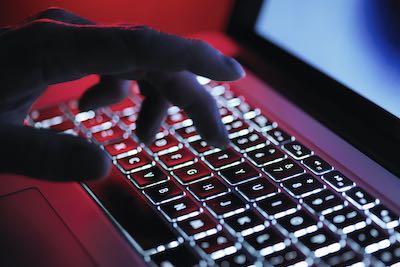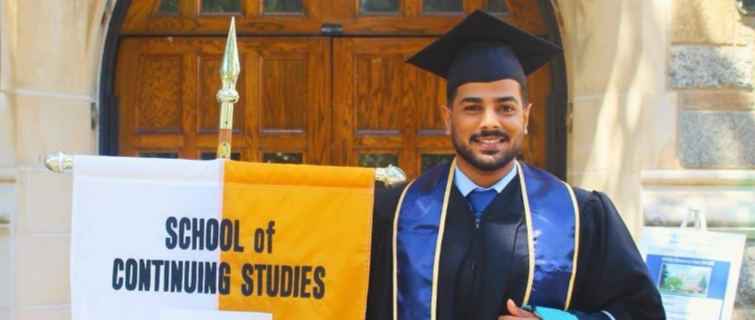
At about mile seven, Gini Khalsa turned to his graduate student and asked, “Are you sure you want to do this, because it’s going to be a long walk and a lot of time?”
In fact, it had already been a long walk—and a lot of time. But Khalsa, who is 60, a resident of Hagerstown, Maryland, an IT specialist, and what you might call an enthusiastic walker, likes to make the most of his trips to Georgetown’s School of Continuing Studies (SCS), where he teaches in the Master’s in Cybersecurity Risk Management program.
And that means getting in a lot of steps each time.
While it was certainly polite for Khalsa to ask Zaki Mohammed (G’25), the student he was walking with, whether he wanted to continue their hike, he had to know what the answer would be—for two reasons. First, they were already well into Northern Virginia and had to get back to SCS somehow; and second, there was absolutely no way Mohammed—who had been talking for several hours with Khalsa about everything from his cybersecurity project to the purpose of life—was going to pack it in.
A Singular Honor
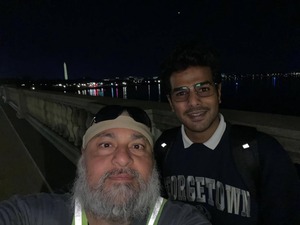
On May 13 at the 2025 Tropaia Ceremony on the Hilltop Campus, Mohammed received the Spirit of Georgetown Award, which honors a graduating student or alumnus who exemplifies the university’s values of people in service to others, commitment to justice and the common good, intellectual openness, and leadership. He also won the Outstanding Student Award for the Cybersecurity Risk Management program.
To win awards such as these, one has to have accomplished a lot of things. And it is easy to list at least a portion what Mohammed has accomplished in his two years at Georgetown: served in GradGov, the university-wide graduate student government as the representative for the Cybersecurity Risk Management program; founded the Georgetown University Cybersecurity Society; served as a research assistant for the program; published several scholarly papers published; and won the University’s Exceptional Master’s Student Award in 2024.
"Georgetown didn’t just prepare me for a career," Zaki commented in a recent Q&A for SCS's Mission in Motion blog. "It shaped me into someone who sees technology as a tool for meaningful and compassionate evolution."
But to really get a sense of what motivates him, you need to talk with him—maybe not for five hours, like Khalsa did on that walk, but definitely for more than one—and those who have worked with and gotten to know him.
“Dedicated, enthusiastic, energetic,” is how Khalsa describes Mohammed: “Once in a while, you get students who are so committed to doing good in the field and putting their best foot forward—and continuing to do that.”
Author and cybersecurity consultant Henry Sienkiewicz also taught Mohammed and, like Khalsa, recommended him for the Spirit of Georgetown Award. His impression sounds remarkably similar.
Every so often, “you meet students who end up challenging you, and he clearly did that,” Sienkiewicz says. “He’s got a great mind and wonderful insights on a variety of topics, all related to some type of cybersecurity. But he, quite frankly, made me better at my game.”
A Passion for Cybersecurity
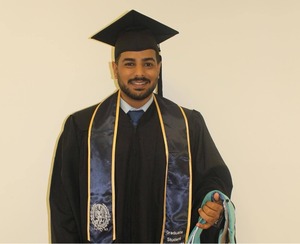
Mohammed grew up in a small town in southwest India, where he and his three siblings were expected to excel in school. And all of them did—except him. “Problem child,’’ is how his mother labeled an online folder she kept about him. It was said in jest but had a ring of truth. Although he loved tinkering with electronics—and once short-circuited the entire house when one of his experiments went awry— Mohammed was, by his own admission, “naughty” in middle school: cutting up in class, not finishing his homework, and not particularly interested in what he was supposed to be learning.
That feeling persisted into college, where he majored in computer science technology—programming, coding, and developing software—but didn’t find that very exciting, either. Still, Mohammed didn’t want to disappoint his parents, especially when his siblings were doing so well. Two of them are now doctors, and the third, his twin brother, worked for two years at PricewaterhouseCoopers in India and is now enrolled in SCS’s Cybersecurity Risk Management program.
But something clicked for Mohammed when he discovered cybersecurity.
“I took a class called ‘Advanced Computer Networks and Network Security,’ which was very intriguing for me,” Mohammed says. “There are vulnerable systems out there and people who are trying to exploit those vulnerabilities and do bad for the world. I wanted to be on the frontlines of the cyberworld, where you can defend from those people.”
Mohammed conducted a research project with one of his professors, published a paper, and was given a young researcher award—all while working at two startups. But after about three years, he realized he needed more formal training and began searching for graduate schools. He looked at three programs in the United States, but Georgetown stood out.
“It was perfectly aligned with what I wanted to know because I had a lot of technical knowledge already developing cybersecurity programs because I had worked in the field,” Mohammed says. “But the risk management side of things is what I really wanted to learn more, so Georgetown’s Cybersecurity Risk Management was a really good program.”
A Walk Around the City
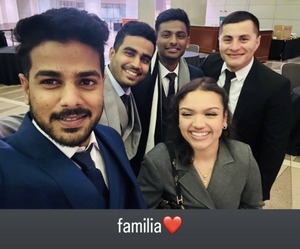
Mohammed loved Georgetown’s program and the fact that “amazing people who are already working in so many good positions… came in and shared that knowledge.”
One of those was Khalsa, who has an expansive view of what graduate studies can be. In class, Mohammed naturally asked a lot of questions, many to do with his project on “threat-informed defense architecture” for critical infrastructure like factories and power grids. The more questions Mohammed asked, the more Khalsa realized he already knew a lot about the subject.
“You should teach this,” Khalsa said and suggested Mohammed lead one of his three-hour classes.”
“I have no teaching experience. I’ve never taught anyone, and I’m afraid of public speaking,” Mohammed said.
“You’ll be fine,” Khalsa replied. And he was.
Their above-mentioned walk had a similar origin: Mohammed had a question about some technical aspects of his senior project.
“So, I just called him and we started talking,” Mohammed says. “And he was, like, ‘What are you doing now?’ I told him, ‘I’m sitting in a coffee shop.’ And he was, like, ‘Do you want to walk around and talk about it?’ And I just said, ‘Sure. Why not?’”
Five hours and 16 miles later, after essentially following Khalsa’s regular route around D.C. and Northern Virginia—“We were going to get to the Air Force Memorial,” Khalsa says, “but I missed one of the turns”—they arrived back at SCS. They had talked about a lot of things, most of them connected to what the digital age has done to change society, both for good and ill, Mohammed says. Where have we been, and where is it all headed? Why, for example, did we even need digital platforms like Facebook and Instagram?
“And we were just trying to comprehend,” Mohammed says, “where cybersecurity fits into all these things.”
